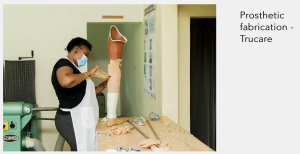
In the digital age, I am both a professional and an individual navigating a rapidly evolving digital and learning landscape. I leverage digital tools for research, networking, and advocacy in prosthetics and orthotics, ensuring that technology enhances access to rehabilitative care. At the same time, I maintain a personal digital identity where I interact with broader discussions on business, ethics, and healthcare. My journey through the digital landscape has been significantly shaped by entrepreneurial endeavours and academic pursuits, leading to marked growth (Zhang, 2021) in both my entrepreneurial and academic journey. As an entrepreneur, I use digital platforms for communication, marketing, and collaboration. For example, I use social media platforms like Instagram @trucare_pno, Tiktok @trucareltd and Website http://www.trucareltd.com/ to market prosthetic products and services. As an academic, I engage with scholarly databases like Cinahl and Scopus and research tools such as Endnote to support my academic work. Personally, I balance my online presence, like on my personal Instagram @eunice.kombe; my interactions align with my values and objectives and focus on my professional attributes, ensuring that my digital footprint remains authentic and purposeful.
The concept of Open Networked Learning (ONL) presents exciting possibilities for my development. It fosters collaborative and interdisciplinary learning, aligning well with my experience in research and healthcare innovation. ONL allows for broader engagement with diverse perspectives, helping me refine my understanding of digital education, inclusivity, and knowledge-sharing. So far, my experiences with ONL have emphasized the importance of open access to information and the role of digital communities in professional growth. Engaging in discussions and readings on digital identity has encouraged me to reflect on how I present myself online and how I can optimize digital tools using tools like ClickUp to support my entrepreneurial and academic work. Discussions on Topic 1, have also reinforced the importance of data privacy, digital ethics, and responsible online interactions.
Reflecting on Topic 1 readings and discussions, I recognize that the boundaries between personal and professional digital identities can be fluid, depending on the hierarchies between teachers and students. However, utilizing universal design for learning and approaching learning spaces from a facilitator perspective can enable the sharing of best practices and build confidence (Wenger, 1998). Digital platforms provide powerful opportunities to enhance learning and business, but they also require critical engagement to navigate misinformation and ethical dilemmas effectively. Overall, my journey in the digital age is one of continuous adaptation and intentional engagement. By embracing ONL Topic 1 principles and digital literacy, I am better positioned to contribute to my field, foster collaboration, and drive impactful change in prosthetics and orthotics care.
References
- Zhang, Z. (2021, April). The impact of digital technologies on entrepreneurship education. In2021 6th International Conference on Social Sciences and Economic Development (ICSSED 2021) (pp. 448-452). Atlantis Press.
- Wenger, E. (1998). Communities of Practice: Learning, Meaning, and Identity.